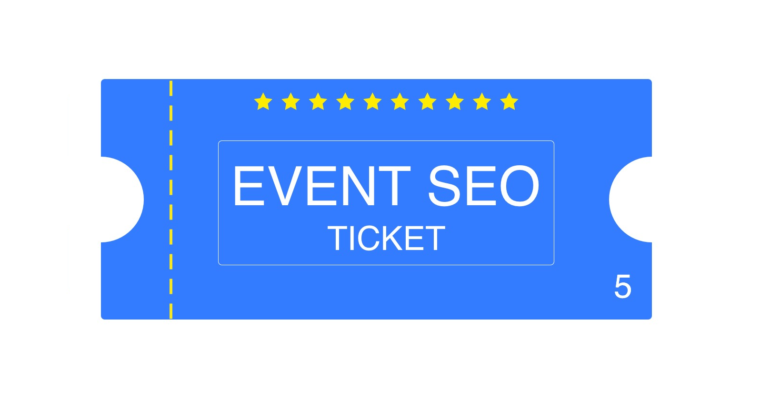 ‘ );
‘ );
h3_html = ‘
‘+cat_head_params.sponsor.headline+’
‘;
cta = ‘‘+cat_head_params.cta_text.text+’→‘
atext = ‘
‘+cat_head_params.sponsor_text+’
‘;
scdetails = scheader.getElementsByClassName( ‘scdetails’ );
sappendHtml( scdetails[0], h3_html );
sappendHtml( scdetails[0], atext );
sappendHtml( scdetails[0], cta );
// logo
sappendHtml( scheader, ” );
sc_logo = scheader.getElementsByClassName( ‘sc-logo’ );
logo_html = ”;
sappendHtml( sc_logo[0], logo_html );
sappendHtml( scheader, ” );
if(“undefined”!=typeof __gaTracker){
__gaTracker(‘create’, ‘UA-1465708-12’, ‘auto’, ‘tkTracker’);
__gaTracker(‘tkTracker.set’, ‘dimension1’, window.location.href );
__gaTracker(‘tkTracker.set’, ‘dimension2’, ‘seo’ );
__gaTracker(‘tkTracker.set’, ‘contentGroup1’, ‘seo’ );
__gaTracker(‘tkTracker.send’, { ‘hitType’: ‘pageview’, ‘page’: cat_head_params.logo_url, ‘title’: cat_head_params.sponsor.headline, ‘sessionControl’: ‘start’ });
slinks = scheader.getElementsByTagName( “a” );
sadd_event( slinks, ‘click’, spons_track );
}
} // endif cat_head_params.sponsor_logo
Events are amazing, they bring people together so they can share in a live experience.
If you are a person who puts on events, or you do marketing for a company who organizes events, then you really need to be aware of how you can reach your audience and get as much visibility in Google search.
You need to learn about the search engine result features that exist for “events” based searches.
The events carousel and the events pack.
The Event Pack
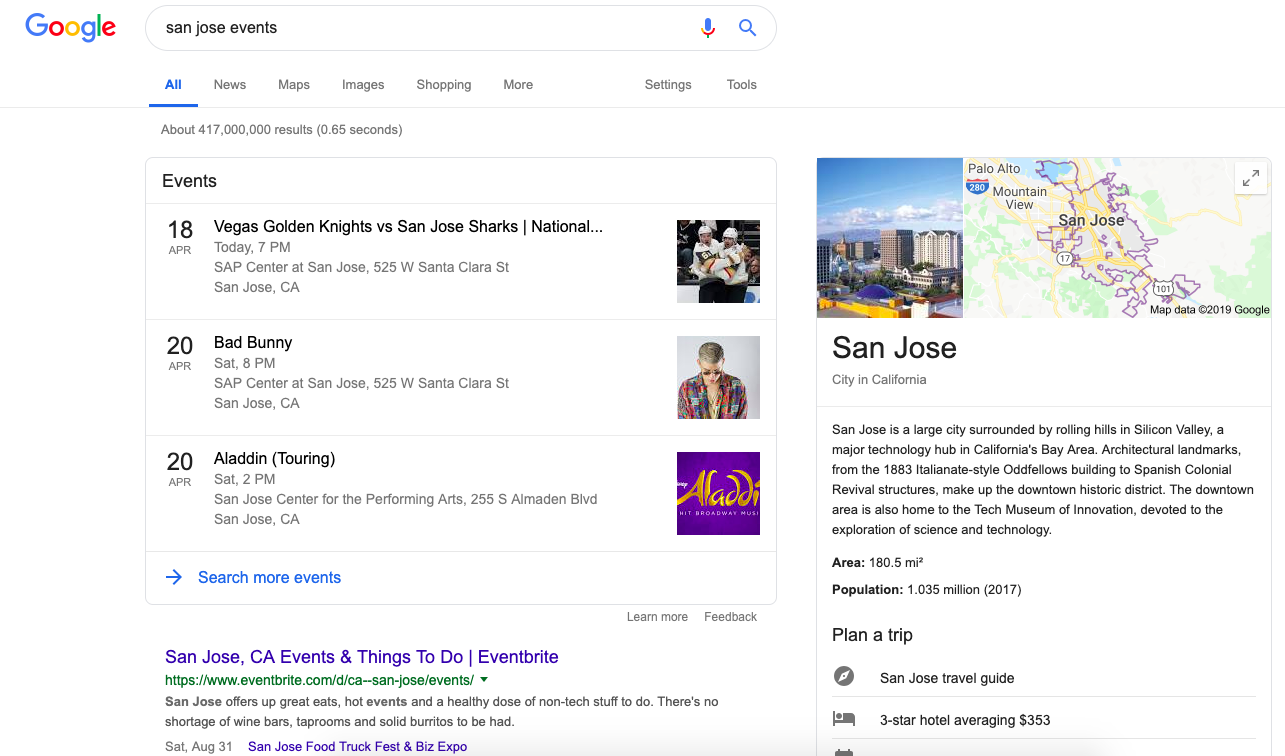
The events pack is a search engine results page feature that displays events similar to the local pack. It can contain one to three results and is placed above the traditional organic search results.
This event pack is powered by events search. When you click a result within the event pack you get taken to Google’s event search experience.
The events pack is important because it offers an ability to rank in “position zero,” a positioning that has a higher click-through rate than ranking in position one within the traditional organic search results.
Ranking in Position 1 already offers a click-through rate upwards of 35%. But with the new event pack in place, what a searcher sees above the fold is potentially just the events pack and the first organic result – making organic Position 1 really Position 4.
The events pack is triggered by events based searches.
Here are a few searches you can try to trigger an event pack to appear:
- Concerts
- Festivals
- Events
- Shows
- Nightlife
- Parties
- Location + “near me”
- Tickets
There are hundreds of ways to trigger the event pack, and it is based on Google’s understanding of what qualifies as an event.
The event pack offers an exciting new opportunity for those who do SEO for events much like how the local pack changed how we did local SEO.
It also provides a unique ability to rank high on search engine results page using both traditional and non-traditional ranking factors.
The Google event experience gives users two options when interacting with a search result.
The Google Event Carousel
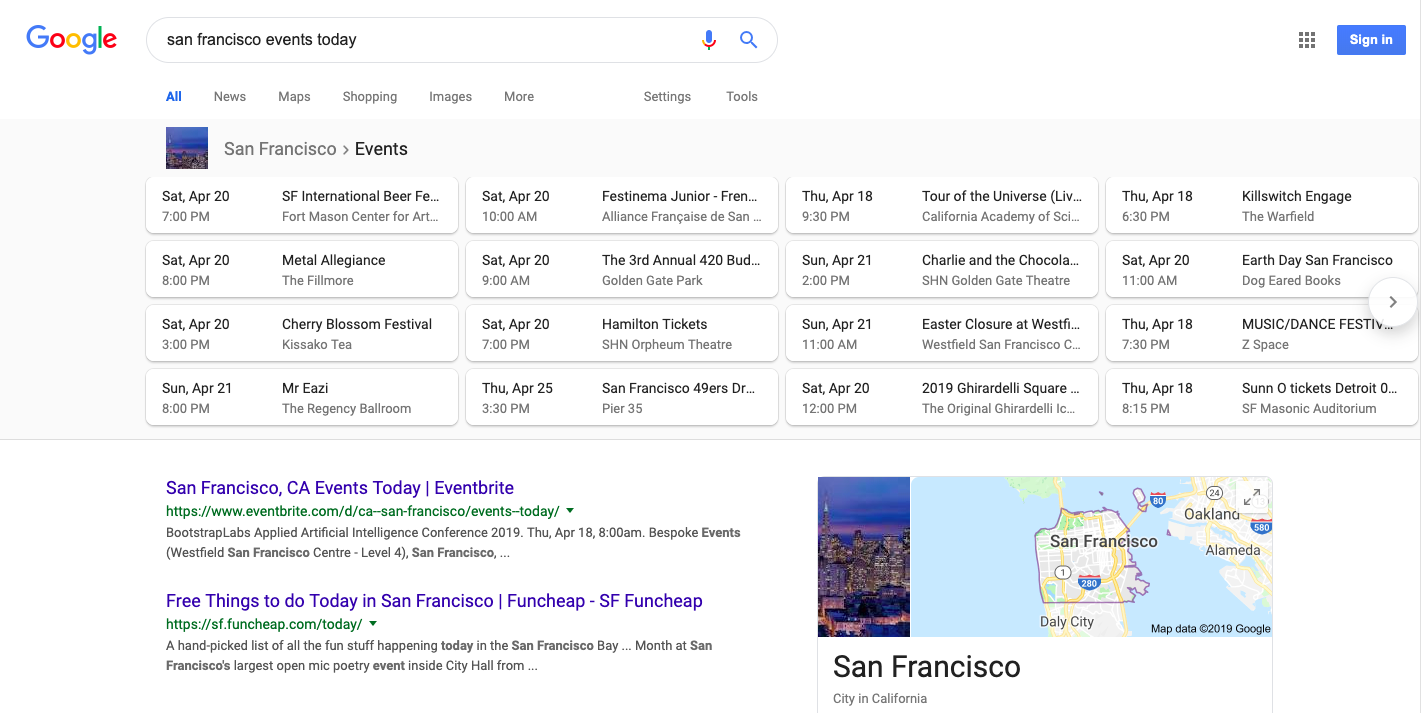
The event carousel, which also sits above the organic search results, is another search engine results feature that you need to be aware of when optimizing your event pages.
It can display 16 results above the fold on desktop and four results on mobile.
What’s the Difference?
Here’s the difference between these two SERP features:
- When you click on a result in the event carousel it sends you to a new search results page.
- When you click a result within the events pack it sends you to the event search experience where those results send you directly to an event page that Google has crawled and indexed.
Knowledge Panels for Venues Performers
Events are also visible in knowledge panels for performers and business venues.
Events are sections within those knowledge panels and are more prominent in mobile search results than desktop search results.
The important things to note is that the behavior of these results in the knowledge panel can trigger different experiences.
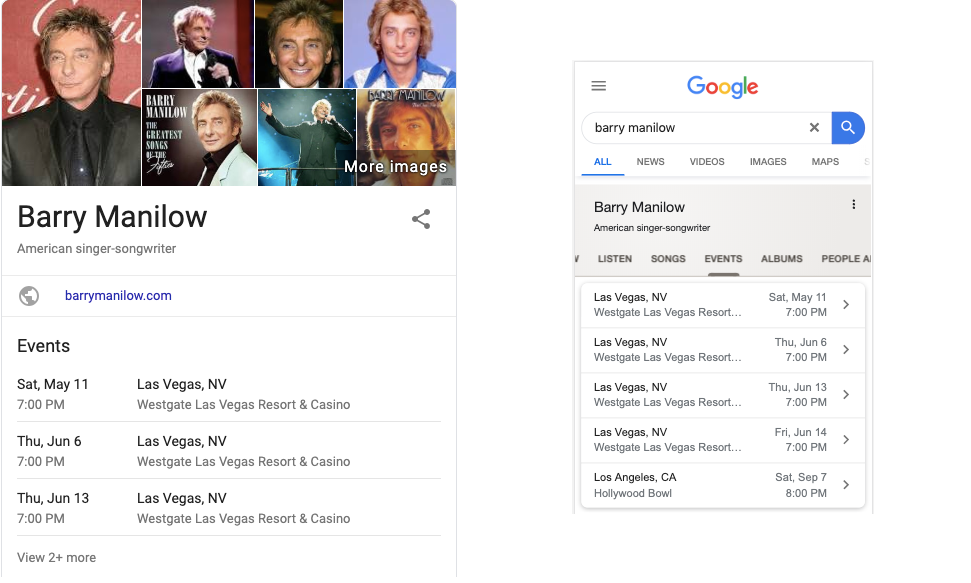
Barry Manilow Knowledge Panel
On desktop, the links within the knowledge panel event section act similar to the events carousel – where it sends you to a new search results page.
On mobile, when interacting with the knowledge graph for events, the experience sends you to a page where you can purchase tickets to that event.
Promoting an upcoming event?
Here are five tips to leverage the different SERP features available for events, increase visibility, and boost attendance.
Tip 1: Use Event Schema
This is the most important aspect of doing SEO for events.
You need to mark up your pages with the appropriate event schema to get the full benefit of the organic search results, including:
- The event pack.
- The event carousel.
- The Knowledge Graph/panel.
- Rich snippets.
Google outlines the type of markup you should include on your pages when marking up your event and offers guidelines on when not to implement schema markup for events.
Important areas you need to have marked up:
- Location (venue)
- Location Address (venue address)
- Name (Event Name)
- Start Date
- End Date
- Description
- Image
- Location name (venue name)
- Offers
- Offers availability
- Offers price
- Performer
The schema that is required by Google provides you with benefits in search.
The event carousel and the event pack can both be triggered by exact event name searches as well as venue name event searches.
The start date markup helps Google to organize events so that they can deliver the most relevant results for common time-based searches like – events today, tonight, tomorrow, this weekend, this week, and this month.
These time-based options are available within the event pack for mobile results.
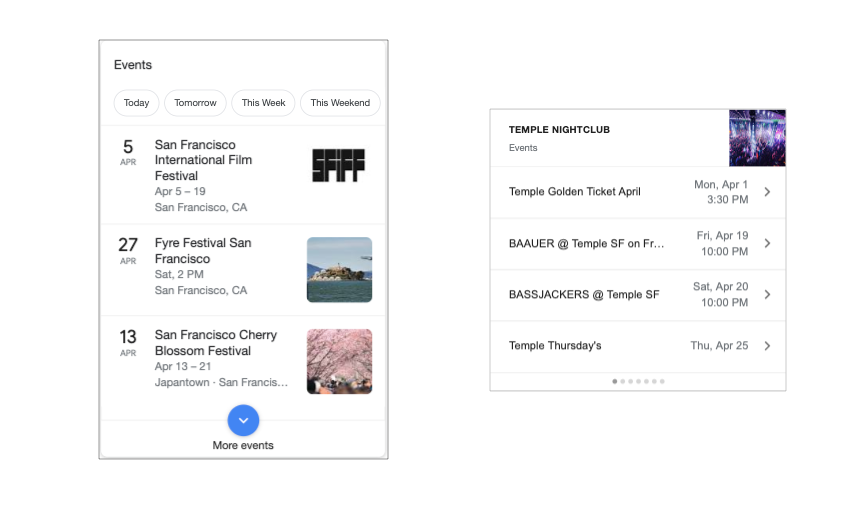
The required schema adds rich snippets to your organic search results. You could get fields under your result for the date of your next upcoming event, the event name, and the venue name.
This is important because these rich snippets offer the ability for a searcher to click directly into that event page from the organic results.
In the example below, there are four links on one result which offers more ways to gain traffic to the pages.

You should always use the Structured Data Testing Tool to make sure the schema you are sending does not have any errors.
Tip 2: Build Links Draft Great Content
The event experience in Google displays both transactional pages and editorial pages. The event pack allows the option for a user to:
- Either buy tickets.
- Or to get more info.
Google crawls the web to find the best source of information for the events that they display in this experience.
The information that is displayed here is at times not from the event creator’s site but other known publishing sites.
If you are an event marketer, you should already be building publicity or buzz for your event.
The more exposure you are able to get from content producers, the more likely you can end up in these search results.
It is also a mutually beneficial relationship because an editorial site can write about your event and benefit from the traffic they can get from those who click on these links. You can get rewarded whenever an attendee reads that article and is enticed enough to want to buy a ticket to your event.
In this case, the editorial site can link back to your site and help you sell more tickets. Building links will help Google find your events faster and give them more reason to rank your event above similar events.
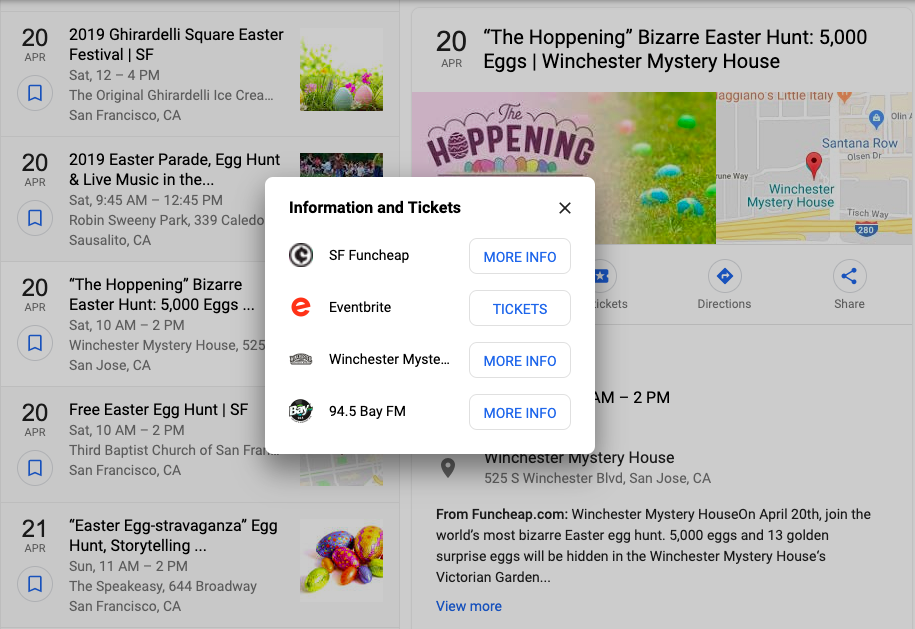
Options to Learn More or Purchase Tickets
Tip 3: Strategically Use Keywords in Your Event Names
You have some ideas on what triggers the event carousel or the event pack. You understand that there are categories that Google looks for when potentially recognizing an event.
It’s important to take advantage of what you know and optimize your event names to try and get the most traffic to your event pages.
Doing keyword research on terms that trigger the event pack will help you provide focus on what potential names will do better in search.
Example Query 1: International Beer Festival
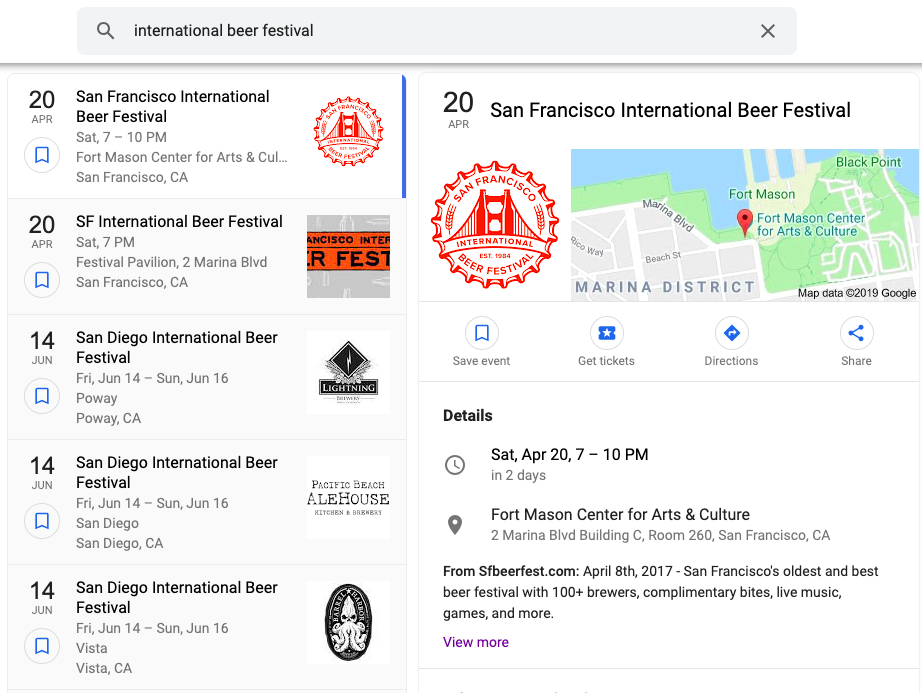
If you look at the results for a search like “international beer festival”, Google is able to determine that my location is in San Francisco, so it displays the most relevant results to my query based on proximity.
But, past the two San Francisco events, Google starts recommending me San Diego International Beer Festivals. That is because the event names have the exact term I searched for, which was “international beer festival”.
Knowing how the behavior of event search works, we need to add keywords to the names of our events.
If you are hosting a beer festival, make sure to call it a beer festival.
If you are having an event in a specific city, try to mention that city in the name of the event.
Example Query 2: San Francisco Events
We see that every result displayed here mentions the city name in the event title.
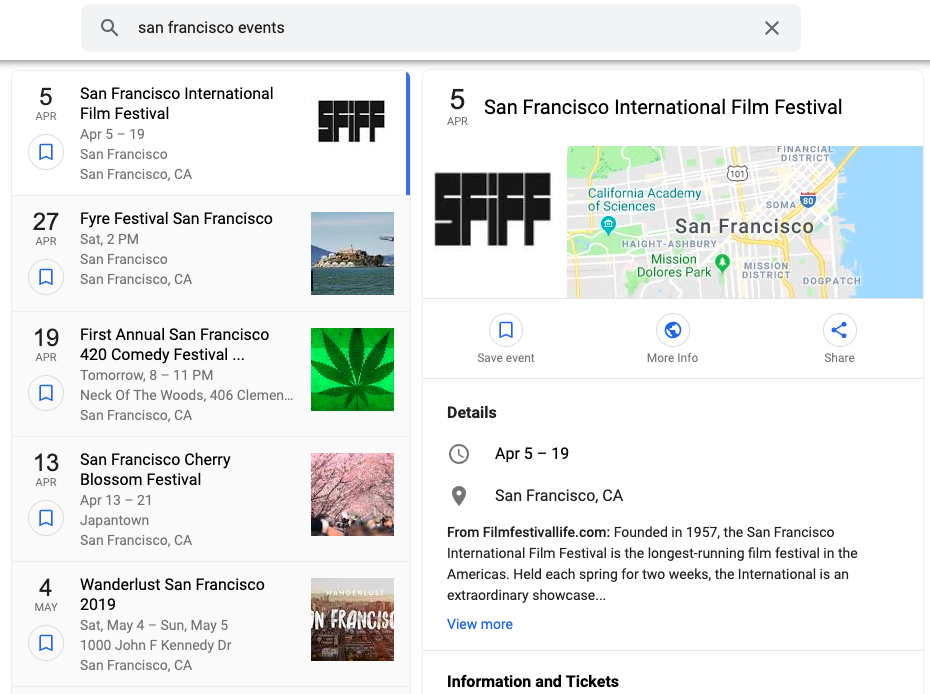
Tip 4: Think More About Dates Time
Start dates are important. You want to make sure you’re using schema to alert Google when your events are happening.
Google cares about the timing of an event, that is why you need to be specific about when an event happens to take advantage of timely searches.
You can alert Google about the specific time of day your event starts and help you rank for keywords like “events tonight.”
If your event will happen on non-consecutive days, make sure to have an event page for each day available and have them marked up with event schema.
This is to avoid event attendees from trying to attend an event that is not happening.
Google mentions a specific way to deal with multiple day events in their content guidelines.
Mark up multi-day events correctly:
- If your event or ticket info is for an event that runs over several days, specify both the start and end dates of the event.
- If there are several different performances across different days, each with individual tickets, add a separate Event element for each performance.
Tip 5: Take Advantage of Ticketing Marketplaces Sites
When we look at the new event experience, Google only allows users to purchase tickets from a select few sites.
Google offers an event ticket seller certification that I believe they use to determine which sites get this option in these results.
Know sites that have this option to purchase tickets from this experience include:
- Eventbrite (Disclosure: I work at Eventbrite.)
- StubHub
- LiveNation
- Ticketmaster
- VividSeats
- Songkick
- TicketFly
- Gametime.co
If you are are trying to market your event, it will be beneficial to get listed on some of these sites because they can reach your audience and allow them another method to buy tickets to your event.
These sites:
- Offer you a platform to promote your event to a wider audience.
- Are present in most broad event-related searches – some will even allow you the ability to link back to your respective domain.
Tracking Your Event Listings
Use Google Search Console’s Enhancements section to discover errors with your event markup.
Google Search Console also provides the ability to track an Event listing in the Performance section under the Search Appearance section and the clicks you are getting from them.
Use this to monitor the traffic that is coming from the SERP features you appear in.
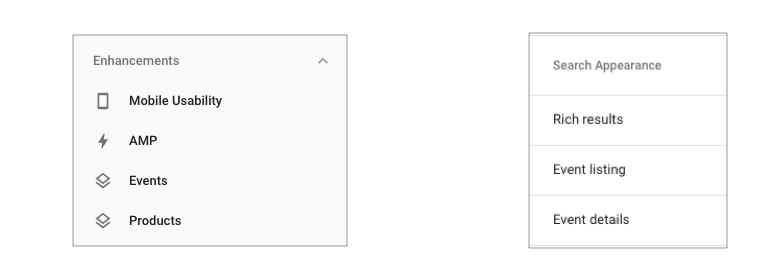
Conclusion
The SERP features in Google right now should make event creators excited about the future of Event SEO.
With the nature of events being timely, the search results change daily and can make event marketing a viable way to build consistent traction for a business with SEO.
More Resources:
- Google Maps Rolls Out New Public Events Feature
- Google Makes Event Structured Data More Useful
- How to Use Schema for Local SEO: A Complete Guide
Image Credits
Featured Image: Created by author, April 2019
All screenshots taken by author, April 2019
